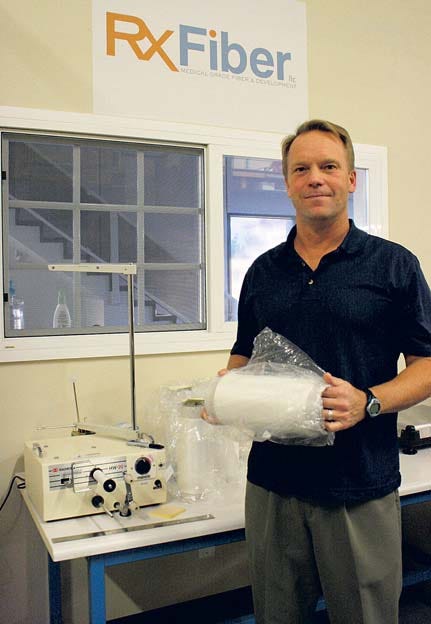How a Medtech Engineer Became an Entrepreneur
September 9, 2014
An engineer with 25 years of experience in the medical device industry, Robert Torgerson decided to change career paths in 2013 by creating his own company: a medical-grade fiber specialist named RxFiber LLC (Windsor, CA).
Now the CEO of that firm, Torgerson must be doing something right: the company has recently won two awards and their technology was featured in a presentation at the annual Society for Biomaterials meeting. Last year, the firm's novel microfiber, RxFibron HT, won UBM Canon's Golden Mousetrap award. In 2014, the company won the North Bay Business Journal's Manufacturer of the Year award.
|
Torgerson holds a spool of RxFiber's medical-grade fiber before shipment. |
To hear the story behind the company, as well as the secret of their success, we reached out to Robert Torgerson, and learned about his background in the med device industry and his inspiration for launching a startup.
MPMN: How many cubicles have you occupied in your Medtech career?
Torgerson: Hundreds! It wasn't unusual for me to be assigned a cubicle only to be moved within a month due to growth, downsizing, or other unknown reasons. I noticed over my 25 years working in medtech, my cubicle size got smaller and smaller while working for various manufacturing companies, starting at U.S. Surgical as a R&D chemist (the lab was my cubicle) focusing on absorbable polymer development, then to CR Bard as a R&D engineer/program manager where I focused on hemostasis devices. After that, I went to go work at Medtronic, and, lastly, at heart valve startup Direct Flow, before leaving my last cubicle in 2013 to start my own company, RxFiber.
MPMN: What inspired you to take a risk and start your own company?
Torgerson: During my tenure in medical device manufacturing, I grew tired of being limited to purchasing off-the-shelf textiles for my R&D projects. Prior to RxFiber, engineers were limited in creating next-generation medical devices using yesterday's materials, especially off-the-shelf industrial materials. I was inspired to provide medical device engineers with biotextiles with custom properties. One of my first initiatives was to develop a microfiber, later known as RxFibron HT, that was small enough, yet strong enough to allow engineers to innovate lower profile devices. I was also inspired to provide a medical-grade fiber to the medtech industry and give engineers the ability to sleep at night knowing they are able to have consistent fiber properties, traceability and textiles produced under ISO 13485 standards.
I decided to pursue RxFiber LLC as a full-time venture after surviving and recovering from a deadly bacterial strain called leptospirosis, which I was exposed to while diving into fresh water during a vacation in Costa Rica. It was a scary time, but it inspired me to pursue RxFiber on a full-time basis.
MPMN: What advice would you give to your fellow medtech engineers that have ideas and are thinking about leaving the security of their cubicles?
Torgerson: Don't be afraid to pursue your passion. Engineers, for the most part, like security and predictability; it seems to be the nature of most of us engineers. My best advice would be to do your homework first; study the market, create a business plan, get quality customer commitments or interest before setting up shop, and surround yourself with a seasoned board of advisors (with people that have been there, done that). Run the idea by your board or other trusted advisers to ensure you have a viable idea before leaving the secure cubicle.
MPMN: How has your understanding of engineering changed after you have transitioned from working for medtech companies to forming a startup that does business with them?
Torgerson: My perspective hasn't changed, but I have more freedom now to tinker on ideas and solutions. Plus, I can decide how big my cubicle is. However, needless to say, in a startup growth company, resources can be limited compared to working in medtech and the risk is higher.
MPMN: What do you miss most from your former life as a cubicle-dwelling medtech engineer?
Torgerson: I miss working with some of the engineers I collaborated with along the way. There were some fun times and I learned a lot from other engineers. I also miss the group health insurance rates and the year-end bonus.
MPMN: What do you look forward to in your new role?
Torgerson: I enjoy the variety of development projects we are supporting our customers on and being able to change the way fiber is developed and supplied to the medtech industry. Our team looks forward to moving into a larger space to support our growth, to developing more novel materials and to continuing our long-term research on our next generation fibers. I look forward to the day when RxFiber is the industry standard used for biomaterial applications.
Refresh your medical device industry knowledge at MEDevice San Diego, September 10-11, 2014. |
Brian Buntz is the editor-in-chief of MPMN and Qmed. Follow him on Twitter at @brian_buntz.
About the Author(s)
You May Also Like



